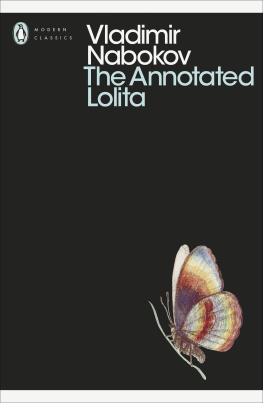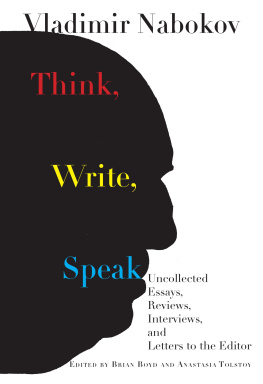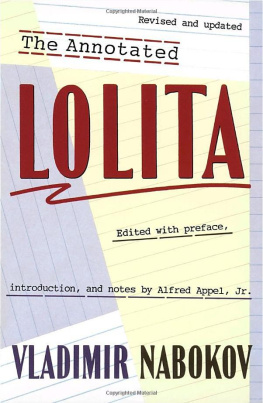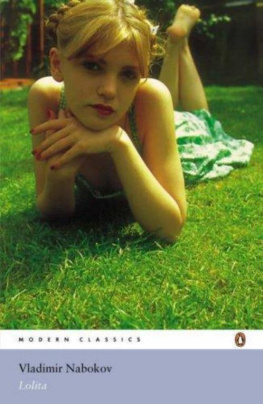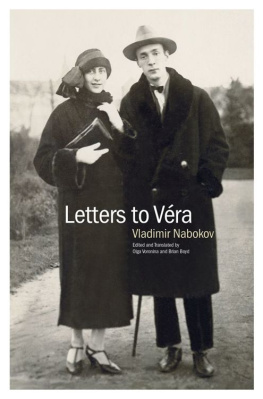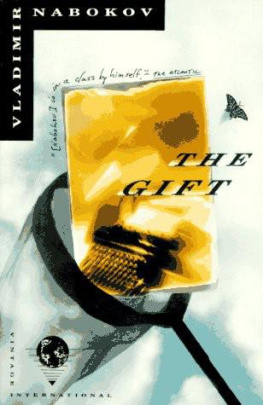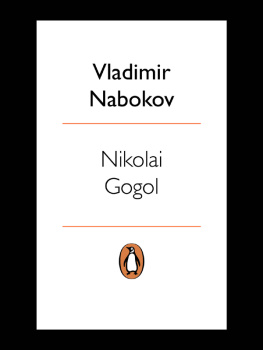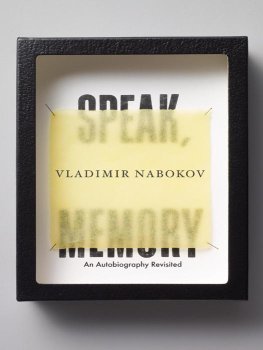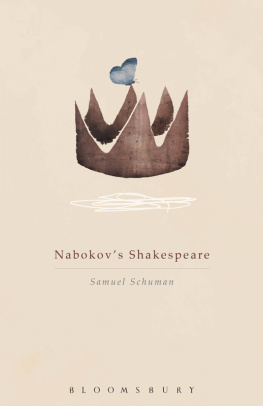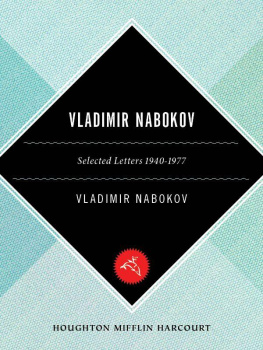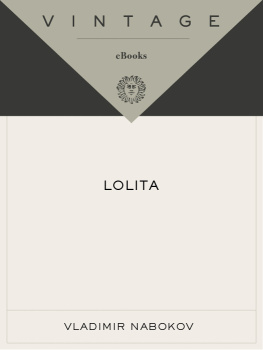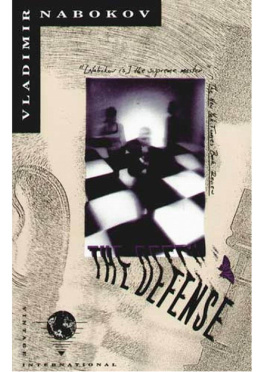Vladimir Nabokov - The Annotated Lolita
Here you can read online Vladimir Nabokov - The Annotated Lolita full text of the book (entire story) in english for free. Download pdf and epub, get meaning, cover and reviews about this ebook. year: 2013, publisher: Penguin Books Ltd, genre: Art. Description of the work, (preface) as well as reviews are available. Best literature library LitArk.com created for fans of good reading and offers a wide selection of genres:
Romance novel
Science fiction
Adventure
Detective
Science
History
Home and family
Prose
Art
Politics
Computer
Non-fiction
Religion
Business
Children
Humor
Choose a favorite category and find really read worthwhile books. Enjoy immersion in the world of imagination, feel the emotions of the characters or learn something new for yourself, make an fascinating discovery.
- Book:The Annotated Lolita
- Author:
- Publisher:Penguin Books Ltd
- Genre:
- Year:2013
- Rating:4 / 5
- Favourites:Add to favourites
- Your mark:
- 80
- 1
- 2
- 3
- 4
- 5
The Annotated Lolita: summary, description and annotation
We offer to read an annotation, description, summary or preface (depends on what the author of the book "The Annotated Lolita" wrote himself). If you haven't found the necessary information about the book — write in the comments, we will try to find it.
The Annotated Lolita — read online for free the complete book (whole text) full work
Below is the text of the book, divided by pages. System saving the place of the last page read, allows you to conveniently read the book "The Annotated Lolita" online for free, without having to search again every time where you left off. Put a bookmark, and you can go to the page where you finished reading at any time.
Font size:
Interval:
Bookmark:


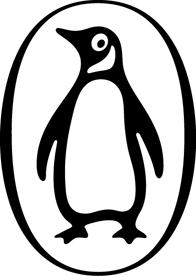


Let the conversation begin
Follow the Penguin Twitter.com@penguinukbooks
Keep up-to-date with all our stories YouTube.com/penguinbooks
Pin Penguin Books to your Pinterest
Like Penguin Books on Facebook.com/penguinbooks
Find out more about the author and
discover more stories like this at Penguin.co.uk
PENGUIN BOOKS
Vladimi Nabokov was born in St Petersburg in 1899, the elder son of an aristocratic, cultured, politically liberal family. When the Bolsheviks seized power the family left Russia and moved first to London, then to Berlin, where Nabokov rejoined them in 1922, after having completed his studies at Trinity College, Cambridge. Between 1923 and 1940 he published novels, short stories, plays, poems and translations in the Russian language and was recognized as one of the outstanding writers of the emigration. In 1940 he and his wife and son moved to America, where he was a lecturer at Wellesley College from 1941 to 1948. He was then Professor of Russian Literature at Cornell University until he retired from teaching in 1959. His first novel written in English, The Real Life of Sebastian Knight, was published in 1941 and his best-known novel, Lolita, brought him world-wide fame. In 1973 he was awarded the American National Medal for Literature. He died in 1977 in Montreux, Switzerland.
His works include, from the Russian novels, The Luzbin Defense and The Gift; the English novels, Lolita, Pnin, Pale Fire and Ada; the autobiographical Speak, Memory, translations of Alice in Wonderland into Russian and Eugene Onegin into English; and lectures on literature. All of the fiction and Speak, Memory are published in Penguin.
Nabokov is one of the great writers of the twentieth century. As Martin Amis has written, The variety, force and richness of Nabokovs perceptions have not even the palest rival in modern fiction. To read him in full flight is to experience stimulation that is at once intellectual, imaginative and aesthetic, the nearest thing to pure sensual pleasure that prose can offer.
Alfred Appel, Jr. was born in New York City in 1934 and raised on Long Island. He served for two years in the US Army and was educated at Cornell and Columbia, which granted him a PhD in 1963. He has received Guggenhaim and Rockefeller Foundation fellowships and is presently Professor of English and American Culture at Northwestern University. His other books include Nabokovs Dark Cinema and Signs of Life.
Published by the Penguin Group
Penguin Books Ltd, 80 Strand, London WC2R 0RL , England
Penguin Group (USA) Inc., 375 Hudson Street, New York, New York 10014, USA
Penguin Group (Canada), 90 Eglinton Avenue East, Suite 700, Toronto, Ontario, Canada M4P 2Y3 (a division of Pearson Penguin Canada Inc.)
Penguin Ireland, 25 St Stephens Green, Dublin 2, Ireland (a division of Penguin Books Ltd)
Penguin Group (Australia), 707 Collins Street, Melbourne, Victoria 3008, Australia (a division of Pearson Australia Group Pty Ltd)
Penguin Books India Pvt. Ltd, 11 Community Centre, Panchsheel Park, New Delhi 110 017, India
Penguin Group (NZ), 67 Apollo Drive, Rosedale, Auckland 0632, New Zealand (a division of Pearson New Zealand Ltd)
Penguin Books (South Africa) (Pty) Ltd, Block D, Rosebank Office Park, 181 Jan Smuts Avenue, Parktown North, Gauteng 2193, South Africa
Penguin Books Ltd, Registered Offices: 80 Strand, London WC2R 0RL, England
www.penguin.com
Lolita first published in Great Britain by Weidenfeld & Nicolson 1959
Published in Penguin Books 1980
This annotated edition published in different form by Weidenfeld & Nicolson 1971
Published in its present form in the USA by Random House 1991
Published in Great Britain by Weidenfeld & Nicolson 1993
Published in Penguin Books 1995
Lolita copyright Vladimir Nabokov, 1955
This annotated edition copyright Alfred Appel, Jr., 1970, 1991
All rights reserved including the right of reproduction in whole or in part.
This edition published by arrangement with The Orion Publishing Group, London, and the Estate of Vladimir Nabokov
The moral right of the editor has been asserted
ISBN: 978-0-718-19284-6
to Vra


In the decades since its American publication (in 1958), Vladimir Nabokovs Lolita has emerged as a classic of contemporary literature. This annotated edition, a corrected and chastely revised version of the edition first published in 1970, is designed for the general reader and particularly for use in college literature courses. It has developed out of my own experiences in teaching and writing about Lolita, which have demonstrated that many readers are more troubled by Humbert Humberts use of language and lore than by his abuse of Lolita and law. Their sense of intimidation is not unwarranted; Lolita is surely the most allusive and linguistically playful novel in English since Ulysses (1922) and Finnegans Wake (1939), and, if its involuted and constantly evolving means bring to mind any previous novel, it should be that most elusive of works, The Confidence-Man (1857) by Herman Melville. As with Joyce and Melville, the reader of Lolita attempts to arrive at some sense of its overall meaning, while at the same time having to struggle with the difficulties posed by the recondite materials and rich, elaborate verbal textures. The main purpose of this edition is to solve such local problems and to show how they contribute to the total design of the novel. Neither the Introduction nor the Notes attempts a total interpretation of Lolita.
The annotations keep in mind the specific needs of college students. Many kinds of allusions are identified: literary, historical, mythological, Biblical, anatomical, zoological, botanical, and geographical. Writers and artists long out of fashion (e.g., Maeterlinck) receive fuller treatment than more familiar names. Selective cross-references to identical or related allusions in other Nabokov works (a sort of mini-concordance) will help to place Lolita in a wider context and, one hopes, may be of some assistance to future critics of Nabokov. Many of the novels most important motifs are limned by brief cross-references. Humberts vocabulary is extraordinary, its range enlarged by the many portmanteau words he creates. Puns, coinages, and comic etymologies, as well as foreign, archaic, rare, or unusual words are defined. Although some of the unusual words are in collegiate dictionaries, they are nevertheless annotated as a matter of convenience. Not every neologism is identified (e.g., truckster), but many that should be obvious enough
Font size:
Interval:
Bookmark:
Similar books «The Annotated Lolita»
Look at similar books to The Annotated Lolita. We have selected literature similar in name and meaning in the hope of providing readers with more options to find new, interesting, not yet read works.
Discussion, reviews of the book The Annotated Lolita and just readers' own opinions. Leave your comments, write what you think about the work, its meaning or the main characters. Specify what exactly you liked and what you didn't like, and why you think so.

